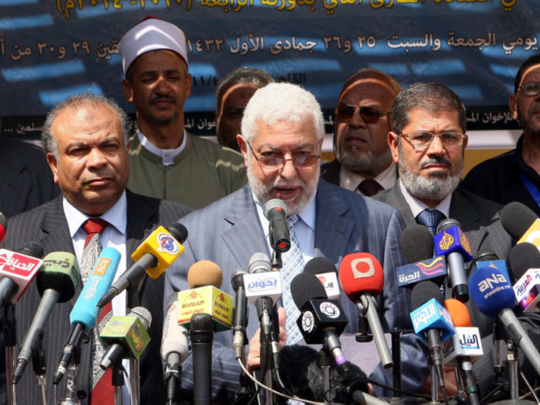
Since the attacks of September 11, 2001 in the US, the received wisdom amongst the western public has been that there’s a link between Islam and terrorism. Media hype, stereotyping, political populism and other attacks like the Madrid train bombings in 2004 and the London transportation network attacks of 2005 reinforced that perception. Some voices of reason, particularly academics and analysts who have long studied “political Islam”, went unheard. The latter used to argue that not all Islamist movements are terrorist, but focussed less on the fact that Muslims (almost a fifth of humanity) are not generally violent. That bit was left to politicians, placating some Arab and Muslim countries incriminated in the “Islamic terrorism” campaigns.
More than a decade after 9/11, the West is fighting “terrorism” again in Syria and Iraq — as shown by its campaign against Daesh (the Islamic State of Iraq and the Levant). Yet, this time the jaded argument by pundits is propagated by politicians in the US and Europe. With Turkey and Qatar on the same page, the argument now is that you need to appease “moderate” Islamists to be able to conquer “militant” Islamists. Ironically, liberals and “progressives” are adopting the same argument even though it contradicts the basic principle of “modernism”: separation of religion from politics.
Unfortunately, the only conclusion that looks more plausible is that of security and intelligence veterans: all these groups originated from the Muslim Brotherhood. Some academics and analysts who argued that way before were labelled as pundits with a “security mentality”. The fact is that ALL these militant groups have their origins in “political Islam”. My first-hand experience in the 1970s and early 1980s makes that a firm fact for me, as all those who led the Jama’ah Islamiya (or Islamic Group) in university in Egypt from which Islamic Jihad and other groups emerged became prominent leaders of the Brotherhood. Even the leading ideologue of “terrorism” who inherited Osama Bin Laden’s mantle — Ayman Al Zawahri — is the nephew of a prominent political Islamist allied to the Brotherhood — Mahfuz Azzam. Essam Aryan, Helmi Gazzar, and others were Emirs of the Jama’ah during my — and their — university years.
The Brotherhood and its affiliates played a key role in recruiting jihadists who went to Afghanistan and Pakistan in 1980s to fight alongside the Mujahideen, and later formed Al Qaida to fight back in their own countries and against the West. Doctors’ syndicates in Cairo — dominated by Jama’ah, i.e. Muslim Brotherhood — witnessed queues of people wanting to donate to the Mujahideen (now terrorists) or volunteering to join them. That was welcome then, as they fought against the Soviet occupation of Afghanistan, and nobody anticipated they might attack the US or fight the Anglo-Saxon occupation of Iraq years later.
It’s too difficult to say what’s the best strategy to eradicate terrorist groups like Daesh, the Ansar Al Shariah in Libya and Tunisia, Boko Haram in Nigeria, Al Shabab in Somalia etc. Yet, without confronting the roots of the violent ideology adopted by these groups, not much can be expected from the current military campaign against Daesh. Libya is actually an example of the ambiguity in the fight against militant Islamists, as US and major European countries insist on including Islamists in the post-Muammar Gaddafi ruling structure in Libya while those Islamists terrorise people because they voted them out. No wonder that Ansar Al Shariah in Tunisia is on the US list of terrorist groups while Ansar Al Shariah in Libya isn’t — even though it’s thought to be behind the assassination of the American ambassador in the Benghazi attack.
It might be good for global finance and economy to develop Islamic products to get investments from Muslims wary of “usurious” derivatives of the mainstream financial system. Yet, it could be dangerous to apply this in politics by propagating political Islam. Ask Egyptians, and now Libyans, what they got from the Muslim Brotherhood in power. Flagging Turkey as an example of “moderate” Islam ruling a country is not plausible — it’s not like Iran. “Bazarites” (upper middle class Iranian businessmen) collaborating with clerics is the perfect example of Islamisation of politics, just like the Brotherhood and groups that emerged from it.
Political Islam had an appeal for decades as many bought the simple slogan “Islam is the solution” against mostly totalitarian regimes in Arab countries. People aspiring for justice and looking forward to a better future supported Islamists and the hard nucleus of their “organised” groups gathered more followers. Everybody was under the impression that political Islam is the only alternative to existing regimes and other “weakened” political forces in the region. But all these perceived delusions faltered as the Muslim Brotherhood was tested in power and revealed the its vile principles and practices. Unless a serious approach to keep politics and religion separate is adopted, we will see many Irans, Daeshes and Afghanistans in the Middle East.
Dr Ahmad Mustafa is an Abu Dhabi-based journalist.








